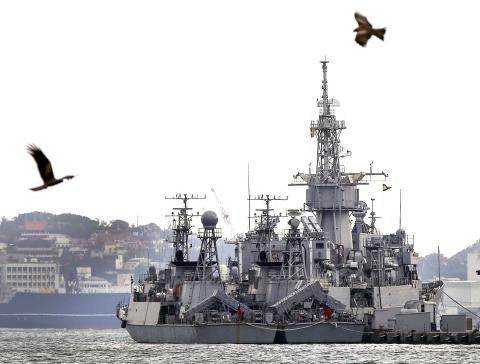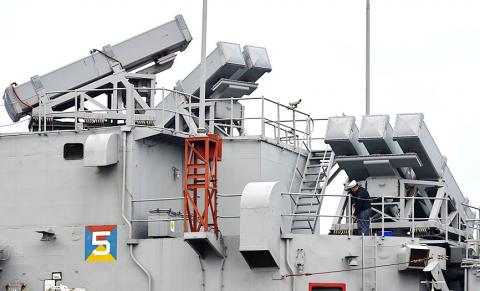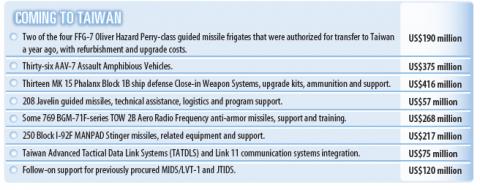In a long-awaited announcement — widely criticized as too little too late — the US government on Wednesday said that it would sell US$1.83 billion in weaponry and equipment to Taiwan.
As expected, the deal did not include the systems that Taipei wanted most — F16C/D fighters and technical help with its indigenous diesel electric submarine program.
While most Washington analysts and members of the US Congress were quick to welcome the proposed sale there were also calls for more sales on a regular basis.

Photo: RITCHIE B. TONGO / EPA
China’s strong objections to the sale were thought unlikely to cause a major disruption to Washington-Beijing relations.
The announcement of the sale — the first in four years — came in the form of a notification to Congress that the US Department of State had approved the sale.
The list of items includes two of the four FFG-7 Oliver Hazard Perry-class guided missile frigates that were authorized by law for transfer a year ago, with refurbishment and upgrade costs of US$190 million.

Photo: Sam Yeh / AFP
It also includes 36 AAV-7 Assault Amphibious Vehicles at a cost of US$375 million; 13 MK 15 Phalanx Block 1B ship defense Close-in Weapon Systems, upgrade kits, ammunition and support, priced at US$416 million; 208 Javelin guided missiles, technical assistance, logistics and program support, which are priced at US$57 million; and 250 Block I-92F MANPAD Stinger missiles, related equipment and support, priced at US$217 million.
The list was considered modest, contained no surprises and left military experts mystified as to why it had taken US President Barack Obama’s administration four years to produce.
“It’s clear that the administration doesn’t want to upset mainland China by providing anything that can be seen as upsetting the balance of power in the region or appearing to be offensive,” US Naval Institute analyst Eric Wertheim said.

Senate Armed Services Committee Chairman John McCain urged the White House to consider future requests for arms sales to Taiwan in a “more regularized” process to avoid extended periods in which a fear of upsetting the US-China relationship might harm Taiwan’s defense capabilities.
“For its part, Taiwan will also need to work to meet its commitment to spend at least 3 percent of its annual gross domestic product on defense,” McCain said.
The US-Taiwan Business Council said the timing of the announcement was a signal to China that Washington had equities in the peaceful transition of power in Taiwan and that it supported Taiwan’s democratic system.
The council also said the arms sales package raises serious questions as to whether it served as a response commensurate to the threat posed by China’s military.
Rupert Hammond-Chambers, the council’s president, said that while China had deployed new fighters, submarines and missiles since the last arms sale to Taiwan, the US had consistently refused to consider providing Taiwan access to similar weapons.
“The process for considering, assessing and processing Taiwan arms sales is broken,” Hammond-Chambers said.
“The contorted efforts to provide the minimum over an extended period has amounted to long delays and to the US providing only second-hand equipment and additional munitions for systems already in Taiwan’s inventory,” he said.
Heritage Foundation expert Dean Cheng said the latest package did not address the largest problems facing Taiwan’s national security — the eroding balance in the air and the aging of its submarine fleet.
“Without the ability to control the airspace over the island and a means of keeping the Chinese nervous about the subsurface threat on their navy, Taiwan’s defense posture will continue to erode,” he said.
The US House of Representatives Foreign Affairs Committee Chairman Ed Royce, a Republican, said he was “deeply concerned” about administration delays that “needlessly dragged out this process.”
“We should handle arms transfers for Taiwan just as we would for any other close security partner,” Royce said.
US Representative Eliot Engel, the ranking Democratic member of the committee, agreed.
He said arms sales should be made on a regular basis.
“We cannot allow our relationship with the People’s Republic of China to come at the expense of our friendship with Taiwan,” he said.
The White House spokesperson Josh Earnest would not comment on why it had taken four years to process the package.
“There has been no change to our long-standing ‘one China’ policy that’s based on the three joint communiques and the Taiwan Relations Act,” he said.
State Department spokesperson John Kirby said the US made the decision based on an assessment of Taipei defense needs.
“The Chinese can react to this as they see fit. There is no need for it to have any derogatory effect on our relationship with China,” he said.

SECURITY: As China is ‘reshaping’ Hong Kong’s population, Taiwan must raise the eligibility threshold for applications from Hong Kongers, Chiu Chui-cheng said When Hong Kong and Macau citizens apply for residency in Taiwan, it would be under a new category that includes a “national security observation period,” Mainland Affairs Council (MAC) Minister Chiu Chui-cheng (邱垂正) said yesterday. President William Lai (賴清德) on March 13 announced 17 strategies to counter China’s aggression toward Taiwan, including incorporating national security considerations into the review process for residency applications from Hong Kong and Macau citizens. The situation in Hong Kong is constantly changing, Chiu said to media yesterday on the sidelines of the Taipei Technology Run hosted by the Taipei Neihu Technology Park Development Association. With

CARROT AND STICK: While unrelenting in its military threats, China attracted nearly 40,000 Taiwanese to over 400 business events last year Nearly 40,000 Taiwanese last year joined industry events in China, such as conferences and trade fairs, supported by the Chinese government, a study showed yesterday, as Beijing ramps up a charm offensive toward Taipei alongside military pressure. China has long taken a carrot-and-stick approach to Taiwan, threatening it with the prospect of military action while reaching out to those it believes are amenable to Beijing’s point of view. Taiwanese security officials are wary of what they see as Beijing’s influence campaigns to sway public opinion after Taipei and Beijing gradually resumed travel links halted by the COVID-19 pandemic, but the scale of

A US Marine Corps regiment equipped with Naval Strike Missiles (NSM) is set to participate in the upcoming Balikatan 25 exercise in the Luzon Strait, marking the system’s first-ever deployment in the Philippines. US and Philippine officials have separately confirmed that the Navy Marine Expeditionary Ship Interdiction System (NMESIS) — the mobile launch platform for the Naval Strike Missile — would take part in the joint exercise. The missiles are being deployed to “a strategic first island chain chokepoint” in the waters between Taiwan proper and the Philippines, US-based Naval News reported. “The Luzon Strait and Bashi Channel represent a critical access

Pope Francis is be laid to rest on Saturday after lying in state for three days in St Peter’s Basilica, where the faithful are expected to flock to pay their respects to history’s first Latin American pontiff. The cardinals met yesterday in the Vatican’s synod hall to chart the next steps before a conclave begins to choose Francis’ successor, as condolences poured in from around the world. According to current norms, the conclave must begin between May 5 and 10. The cardinals set the funeral for Saturday at 10am in St Peter’s Square, to be celebrated by the dean of the College